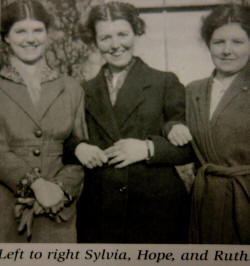

Queer Places:
University of Cambridge, 4 Mill Ln, Cambridge CB2 1RZ
Church Rd & Kells Ln, Low Fell, Gateshead NE9 5JG, UK

Madeleine Hope Dodds was the 2nd daughter of Edwin Dodds and Emily Bryham Mawson, of Home House, Low Fell, where she lived for most of her life. She had an older sister, Mary Muriel (Molly), two younger sisters Ruth (1890-1976) and Sylvia (1892-1969) and one brother, Brian.[1] Her grandfather, MS Dodds, was the founder of the printing business called after him on Newcastle Quayside; her maternal grandfather, John Mawson, of Ashfield, Low Fell, was Sheriff of Newcastle when he was killed in the explosion on the Town Moor in 1867.
Madeleine Hope Dodds went to a female-only high school called Gateshead High School for Girls on the Windmill Hills. After she graduated high school in 1904, she attended Newnman College, Cambridge from 1904 to 1906. Dodds was able to pass within those two years with Second Class Honors in the History Tripos. Dodds was able to get her degree years later because at the time when she attended the college, females were not able to obtain any degree.[2] Newnman College, Cambridge is still one of the few colleges that still give out education to exclusively females.[3] She spent an extra year at Newnham in research and was awarded the Creighton Memorial Prize in 1909.
She then worked for some years for the Victoria Country History, with her college friend, Myra Curtis, who after a distinguished career in the Civil Service, eventually became Principal of Newnham. Hope Dodds returned to Gateshead and continued to devote herself to North Country History.
In 1915, Madeleine Hope Dodds and her sibling, Ruth, wrote The Pilgrimage of Grace, 1536–1537, and the Exeter Conspiracy, 1538, which was published by the Cambridge University Press. Their work is still being recognised a century later. Their book appeared in The American Historical Review,[4] which reviews historical pieces from 1895 to the present. Their work is well respected by scholars who are still alive to this day.[4] Dodds was also featured in a book called, In Search of the New Woman: Middle-Class Women and Work in Britain 1870–1914,[5] which briefly describes her work. Not only did she write The Pilgrimage of Grace, 1536-1537, and the Exeter Conspiracy, 1538 with her sister in 1915, she also wrote journals in her career, like "The Problem of the 'Ludus Coventriae'"[6] and "Political Prophecies in the Reign of Henry VIII".[7] The journals that Dodds have published can range from theatre and poetry to morality, religion and history. Dodds was also one of many who worked for the Newcastle Society of Antiquaries in 1908. In 1947 she was promoted to be an honorary member by the society that she worked for.[1]
From their foundation, Hope Dodds was an active member of the Progressive Players, Gateshead. She produced plays for them at Westfield Hall in the early days and made dramatic adaptations of Jane Austen's Emma and Dickens' Great Expectations which they performed. It was largely due to her generosity that the Gateshead Little Theatre was built for the Players and it has become the dramatic centre of a town and district otherwise devoid of live drama. She attended all the Players' performances as long as her health permitted. In spite of her love of drama, both amateur and professional, she never herself came into the limelight, for her nature was quiet and retiring. But all who did know her appreciated her gaiety, kindness and wisdom and her generosity of spirit.
She never married and lived all her life in the family home, Home House, Kell's Lane, Low Fell, as did sisters Ruth and Sylvia.
My published books: